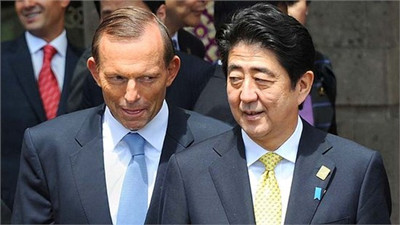澳大利亞和日本
Scrum-halves
逐利先鋒
Closer security ties with Japan unsettle some Australians
一些澳大利亞人對澳日更緊密的國防關(guān)系感到不安
THE prime minister of Japan, Shinzo Abe, flew to the Australian outback's red desert on July 9th to inspect the commodity that once defined his country's relations with Australia: iron ore. He left behind policy wonks in Canberra, the capital, digesting his blunt call a day earlier for a “truly new base” for the relationship between the two countries. After acknowledging the second world war, in which Australia and Japan were mortal enemies, Mr Abe told Parliament that Australia and Japan must now “join up in a scrum, just like in rugby” to nurture regional peace. Many Australians read his remarks as recruiting Australia as an ally in Japan's disputes with China, creating a growing dilemma for some in the host country.
七月九日,日本總理安倍晉三飛往澳大利亞境內(nèi)的紅沙漠視察當?shù)氐蔫F礦,該商品曾一度奠定了日澳兩國關(guān)系。在首都堪培拉,安倍 摒棄其政治專攻的形象,一天前,安倍坦言需為兩國關(guān)系著想,尋求“可靠的合作新基礎(chǔ)”。澳日兩國在二戰(zhàn)中為宿敵,在日本承認其在二戰(zhàn)中的罪行后,安倍授意議會澳日兩國的當務(wù)之急是“像橄欖球的隊友一樣,在亂局中聯(lián)起手來”,并以此維護區(qū)域和平。大部分澳大利亞人將安倍的言辭視為日本是在中日爭端中為本國招募盟友,為了自身利益,卻使澳在進退維谷的漩渦中越陷越深。

Mr Abe had arrived from New Zealand, where John Key, the prime minister, opposed any attempt by Japan to resume whaling in the Antarctic Ocean following the International Court of Justice's ruling against Japan's “scientific” whale hunts in April. In Canberra, however, Mr Abe's sights were fixed more on the Pacific and Indian Oceans. Mr Abe's speech made no mention of China, yet it was all about that country, its growing military posturing and its challenges to neighbours' maritime claims. Mr Abe called on Australia to join Japan in keeping the Asia-Pacific region's “vast seas” and its skies “open and free”.
在此之前,安倍還到訪了新西蘭,其總理約翰凱伊拒絕日本任何關(guān)于在南冰洋恢復(fù)捕鯨的企劃,因為四月份日本提出的的“科學”捕鯨計劃違反了國際法庭在此方面的管制。然而,在堪培拉,安倍把目光鎖定在了太平洋和印度洋。安倍雖未曾提及中國,然則其所有舉動皆與中國有關(guān),比如說其上升的軍事態(tài)勢,或是其對于中國領(lǐng)海主權(quán)的挑釁。安倍呼吁澳大利亞與日本結(jié)盟,保衛(wèi)亞太地區(qū)“廣袤的海洋”,并最大程度實現(xiàn)“開放與自由”。
As the first Japanese prime minister to address Parliament, Kishi's grandson “humbly” offered his “most sincere condolences” to those who lost their lives. Mr Abe's reference to the “evils and horrors of history” was the most expansive such acknowledgment by a Japanese leader on Australian soil. The speech was intended to sound frank and open-minded—though not for the first time in the history of Japanese apologetics, it amounted neither to full-blown acceptance of Japanese war guilt nor a clear apology.Mr Abe played on historical resonance in a visit that could go down as a key moment in the two countries' relations. In 1957 Mr Abe's grandfather, Nobusuke Kishi, became Japan's first post-war prime minister to visit Australia, signing a commerce treaty. Yet Japan's attacks in 1942 on northern Australia and Sydney, and the brutal treatment of Australian prisoners-of-war in New Guinea, Borneo and elsewhere, overshadowed relations for decades.
作為第一位在澳議會發(fā)表演講的日本首相,岸信介的孫輩,安倍晉三“低聲下氣”的向在二戰(zhàn)中死去的人們致以“最誠摯的哀悼”。在日總理訪澳的歷史上,安倍在演講中提及“歷史的不幸和慘劇”已算是最為干脆的認罪了。安倍本想讓演講聽起來又坦率又開放——盡管安倍不是歷史上首個道歉的首相,但其演講中既沒有充斥著日本對自身戰(zhàn)爭罪行的認識,也沒有包含明確的致歉。此次訪問是決定兩國關(guān)系是否下滑的關(guān)鍵時刻,安倍走上了其前輩的老路。1957年,安倍晉三的外祖父,成為日本首任戰(zhàn)后首相的岸信介到訪澳大利亞,簽署了一份通商條約。而就在1942年,日本襲擊了澳大利亞北部以及悉尼,殘暴對待新幾內(nèi)亞,婆羅洲還有其他地區(qū)的澳大利亞戰(zhàn)俘,以至于陰影籠罩在兩國關(guān)系之上,數(shù)十年不散。
But Tony Abbott, Australia's prime minister, was not going to let that get in the way. He approved heartily when Mr Abe pronounced that the two countries had cast off “one old layer” to form a new “special relationship”. The two leaders signed a free-trade agreement, and another pact to share defence equipment and technology. Australia needs to replace ageing submarines, and Japan has world-beating engine technology.
但澳大利亞總理托尼阿伯特打算驅(qū)散陰影。他衷心的贊同安倍所宣稱的兩國已不計前嫌,建立新的“特別關(guān)系”。兩國領(lǐng)導(dǎo)簽署餓了自由貿(mào)易協(xié)定,另有一份分享國防設(shè)備和國防技術(shù)的合約。澳大利亞需要更新過時的潛艇,而日本有著一流的機械技術(shù)。
More closely than anyone, China is watching this cosying up between two of America's key Pacific allies, and it does not approve. That unsettles a number of Australians who worry about the growing dilemma of relying on China for prosperity and the United States for security. Ever since China displaced Japan as Australia's biggest trading partner seven years ago, debate in Australia has focused on how the country should balance its relations with China, America and Japan. Mr Abbott unsettled some last October when he (accurately) called Japan Australia's “best friend in Asia”. He supports Japan's decision earlier this month to ditch a ban on coming to the military aid of allies if Japan itself is also under threat. Mr Abbott welcomes Japan's becoming a “more capable strategic partner in our region”.
中國比任何國家都要緊密的關(guān)注著這兩個美國重要的太平洋盟友感情日益升溫,且并不贊同。在依賴中國以實現(xiàn)經(jīng)濟繁榮的同時依賴美國以實現(xiàn)國家安全,兩者間產(chǎn)生的越來越大的矛盾另許多澳大利亞人心神不定。自七年前中國取代日本成為澳洲最大的貿(mào)易合作伙伴以來,澳洲人民便就該如何平衡中美日三國關(guān)系而爭論不休。去年十月,阿伯特明確稱日本是澳洲“在亞洲最好的朋友”,該言辭令小部分人感到不安。月初,他支持日本受到威脅時恢復(fù)來源于盟友的軍事補給路線。阿伯特歡迎日本成為澳洲“在亞太地區(qū)更有能力的戰(zhàn)略伙伴”。
Mr Abbott claims that “ours is not a partnership against anyone”. But that is precisely where doubts remain in the wake of the Abe visit. China's bullying of neighbours over maritime claims is behind much anxiety in Asia, and a chief reason why Japan wants to bolster its own security and recruit friends. Yet Japan's poor relations with neighbours, mainly over wartime history, allows China to tout the myth that Japanese militarism is on the prowl once more. Australians care more than most when China chooses to be angry.
阿伯特宣稱“日澳關(guān)系不針對于任何國家”。但確切來說,在安倍到訪后該言論值得斟酌。中國在海防上的壓制令周邊國家感到焦慮,這也是日本想要加強國防,拉攏鄰國的原因。但是日本因戰(zhàn)事導(dǎo)致的與鄰國的惡劣關(guān)系,中國可以兜老底,稱日本軍國主義依然遺留。澳洲也十分擔心激怒中國。
In the nearly six decades since Mr Kishi's visit, Australia's relations with Japan have spun peaceably around strong trade ties and a mutual alliance with America. China's rise has complicated that. Hugh White at the Australian National University argues that Australia has never had to face a country in its region that is positioning itself as a strategic rival to both Japan and America. For Australia to assume that its interests can be comfortably yoked to Japan's, he says, would be a “very big risk”. The problem is, to yoke Australia's interests with China's would be an even bigger one.
自六十年前岸信介訪澳,澳日關(guān)系依賴著大規(guī)模的貿(mào)易聯(lián)系以及與美國同盟維系起來。中國的崛起令這段關(guān)系復(fù)雜化。澳國立大學的休懷特表示:在亞太地區(qū),澳大利亞從未面臨這樣一個把自己擺在日美兩國戰(zhàn)略敵對關(guān)系的國家。可以想象,澳大利亞與日本互為利益伙伴,但結(jié)成伙伴確需“冒險”。而問題在于,澳中利益將更加難以銜接。












